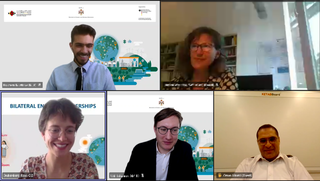Liberalisation Of The Electricity Market In Jordan: The Human Security Perspective

In this online seminar, speakers and audience engaged in a discussion on the future of Jordan’s electricity market. Sparked by a policy paper on the topic by Mr Mustafa Hashemite seminar explored key considerations in liberalising the Jordanian electricity market. Mr Hashem’s paper argues that a liberalisation of what is currently a predominantly state-managed sector would contribute to human security in the country. The discussion was continued by Dr Kirsten Westphal, Senior Associate at the German Institute for International and Security Affairs (SWP) and a high-profile audience from academia, public, and private sector.
Liberalisation of the Electricity Market in Jordan: The Human Security Perspective
Jordan’s electricity market is currently largely administered and owned by public entities. Electricity is generated by a combination of private and state-owned power plants, transmitted by the state-owned National Electric Power Company (NEPCO), and distributed by three companies in the North, South, and Center of Jordan. This stands in stark contrast to the European Union’s electricity market, in which various small, medium, and large companies compete in the different stages of electricity supply. According to Mr Hashem’s arguments, a level playing field for businesses to compete and consumer empowerment to choose their providers will contribute to human security. This specific approach to security focuses on the safety and protection of individuals, rather than states, when assessing policy decisions. Liberalisation is thus argued to offer energy security to individuals ̶ for example through a more stable grid through private sector innovation and reduced energy poverty through competitive prices. Besides enhancing human security, liberalisation may also provide for better conditions for renewable energy sources through an increasingly self-regulated and stable electricity grid.
Jordan’s Energy Strategy 2020–2030 is in line with this approach, aiming to move away from the single-buyer model.
Nevertheless, liberalisation can take different forms and has been criticised to create other, less regulated monopolies in Europe. A classic example for this phenomenon is the privatisation of public transport, often criticised to lead to less efficiency and high prices in the UK. In the Jordanian context, liberalisation will also face a number of regulatory difficulties, which are likely to take time as well as determination and long-term planning to overcome. Thus, the seminar addressed the key issues that policy makers are likely to face throughout the introduction of a new liberalised Jordanian electricity market.
EU Dialogue project
Mr Hashem’s paper is part of the jointly implemented project “Jordan-EU Dialogue on Human Security Issues” by Konrad-Adenauer-Stiftung (KAS) Jordan and the West Asia North Africa Institute (WANA). The publication “Young Voices: Jordanian Youthin Public Policy-Making 2020” is part of the project. With contributions from six young Jordanian analysts, this publication contributes to the overall target to raise awareness on the issues of importance that Jordan must address. The chapters address various human security-related issues in the fields of water, energy, food, mobility, and legal literacy in Jordan.